Why Did Auoda Continue From Hong Kong
I n official Chinese and British versions of Hong Kong history, the choices of the great powers occupy most pages. Little room is given to the voices of the people of Hong Kong. But in the years leading up to the territory's handover in 1997, one group of local industrialists tried – and failed – to influence the course of history.
They were called "unofficials", a group of well-connected local advisers appointed by British governors to their de facto cabinet to advise on the territory's policies. For years, this group of local Hong Kong Chinese were seen as the go-to figures for complex issues. And for a long time, their advice did seem to have certain influence on colonial governors.
But the role of the unofficials began to change when the most contentious subject emerged in the late 1970s. In March 1979, the governor, Murray MacLehose – locally called Big Mac – began to explore the "1997 question" with China's paramount leader, Deng Xiaoping. The governor saw the issues as an "inescapable source of crisis" if left unaddressed.
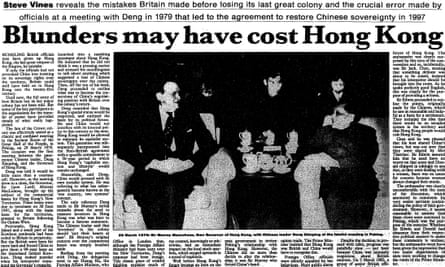
Left in the dark
MacLehose's trip to talk to Deng in Beijing did not go well, according to historians who wrote about the meeting years later. At the time, most of his senior advisers – including SY Chung, an "unofficial" engineer turned politician – were left in the dark as to what was discussed between the British and the Chinese. Without information, many in Hong Kong continued to believe that British administration would extend beyond 1997.
To some, the British governor's secrecy over the details of the meeting with Deng exposed a gap between the interests of the crown and the residents of the colony. Like Chung, most unofficials were left out of the loop, too, says Louisa Lim, the author of Indelible City: dispossession and defiance in Hong Kong. "Their enforced ignorance was not casually done; it was a considered British government strategy, memorialised in diplomatic notes," she says.
In the early 1980s, uncertainties about Hong Kong's future hung over the territory. Having been kept in the dark, there was a sense of urgency among the unofficials; they would have to fight on their own – not against Beijing, but against London.
Throughout that decade, the issue of Hong Kong's identity kept resurfacing. The 1980 nationalities bill proposed a new status for Hong Kong residents as "citizens of a British dependent territory". As the Guardian reported on 7 March 1981, this led some to wonder whether Britain would relinquish its obligations to them if a handover took place.
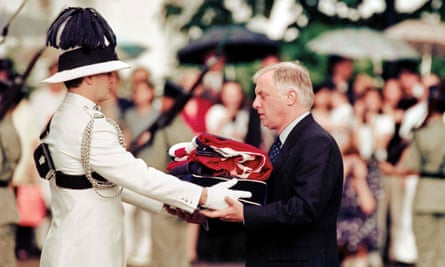
So before the final parliamentary debate in October that year, two unofficials went to London to lobby the British government for British national status for Hong Kong's residents. But the response from British MPs shocked them.
"They all reassured us that it was not the Hong Kong British subject they were after – it was Gibraltarians and all that – but they did say, 'We don't mind having you people in but I certainly would not like to wake up one day and go to my butcher and my druggist to find that Hong Kong Chinese people are running them,'" according to one of the unofficials, the banker Li Fook-wo, who recalled this version some time after the event to the British Hong Kong academic Steve Tsang.
They were humiliated, and went back home. The frustration continued to build up. So much so, Chung told Margaret Thatcher in a private meeting a few months later that if the British government could not trust its own local advisers, some of them might have no choice but to resign.
"The unofficials were in a peculiarly powerless and paradoxical position," says Lim. "To Beijing, they were nonexistent though sometimes sought for their views, while to Britain they were consulted, then ignored."
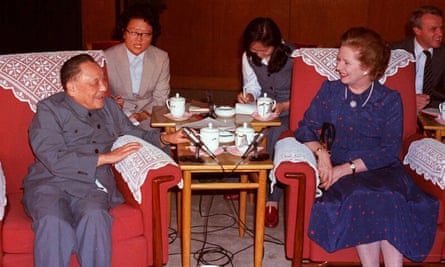
Fears for the future
Throughout the nearly two dozen rounds of negotiations between Beijing and London in the early 1980s, none of the unofficials, such as Chung, were permitted to be present. The British thought their views on China were too "confrontational".
When the decision to relinquish Hong Kong in 1997 was finally announced on 20 April 1984, ironically it brought a sense of liberation to the advisers. Emboldened, a nine-member delegation – led by Chung – went to London to try to exert pressure on the government.
But London was prepared. The press were briefed against them before their arrival and described their statement as "militant". Their crucial questions to their colonial masters were: what would happen if China breached the Sino-British joint declaration? Would residents of Hong Kong be able to cast their vote on the joint declaration? If so, how?
It was a controversial visit at home, too. Pro-Beijing newspapers accused the delegation of "spreading gloom in Hong Kong", despite Hong Kong's stock exchange index having already fallen by 200 points since the 20 April announcement. "We are here to try to reflect the Hong Kong people's aspirations," said Selina Chow, a member of the delegation, as reported by the Guardian on 13 May 1984. "We are asking the British government: 'How are you going to fulfil your obligations to me? How are you going to protect me against these doubts?'"
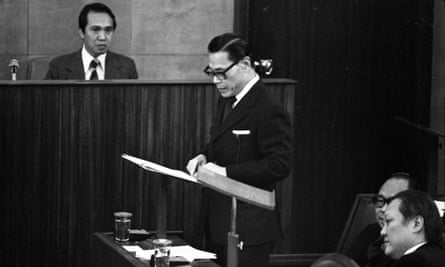
But before they received any answer from London, they were dismissed – including by their former boss, MacLehose, who by now had been given a life peerage. To Chung, it was unforgivable. "I shall never forget the words of the MPs who criticised us, saying that the unofficial members of the two councils were not elected so how could they represent Hong Kong? … I said to them: 'How can you claim that you can negotiate for us? You have no mandate from us either; I never elected you,'" he later recalled to Tsang.
As a sophisticated businessman who had dealt with China often, Chung had been cautioning the British against being too credulous of the Chinese. He had also urged London to make sure Beijing would not break its promises. He had reservations about the proposed agreement. His fears ranged from whether the future Hong Kong governments would actually be ruled from Beijing, to whether Chinese politics would revert to the extreme left. "Looking back today, they were all prophetic," says Lim.
A cold reception in Beijing
Seeing things were going nowhere with London, the unofficials began meetings with Beijing on their own. In June 1984, Chung led a three-member delegation to see Deng in Beijing's Great Hall of the People.
Just as they were accused by London of not having the right to represent the people of Hong Kong, the unofficials were fobbed off in the same way. "Deng told the delegation that he was willing to listen to their views as individuals, but it would not make any difference to China's plans for the colony," according to a Guardian report on 25 June 1984.
"You can say anything you want, but I must point out that the People's Republic of China stands firmly by its positions, principles and policies on the Hong Kong issue," Deng told the trio. "We've heard a lot of different opinions, but we don't acknowledge that these represent the interests of all of the Hong Kong people," he added, accusing Chung and his colleagues of "[having] no faith in the People's Republic of China".
Hong Kong's press described this meeting as a "humiliation". The unofficials, however, put on a brave face, describing the dress-down by the Chinese leader as "very frank and thorough".
"The unofficials tried very hard to put the wills of the people of Hong Kong to policymakers in China and Great Britain but were dismissed out of hand by the Chinese leadership and were not taken sufficiently seriously by the British government," says Tsang, who now directs the Soas China Institute in London.
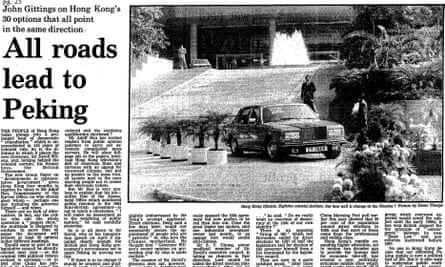
Switching loyalty
A few years after those humiliating trips to both capitals, Chung became a prominent voice in calling the territory's direct election plan "unrealistic". In April 1987, he reaffirmed to the press that Britain would turn Hong Kong over in 1997 "to China, not to the Hong Kong people".
Shortly before Christmas in 1993, Chung went to see Chris Patten, who had begun as the last governor of Hong Kong a year earlier. This time round, his role had changed. "Perhaps inevitably, having failed to influence the departing colonial power, he eventually went over to the other side and is now one of Beijing's advisers," Patten wrote in his diary, which was recently published.
A few weeks later, the two men met again. "He has fallen hook, line and sinker for the Chinese version of the end of the talks," Patten recalled on Monday, 10 January 1994. "It's sad and surprising. He used to argue that we should hold on to Victoria Island and bring in water by tanker if necessary."
After the handover in 1997, Chung was appointed by Tung Chee-hwa, the territory's first chief executive as a non-official convenor of the executive council. He died in 2018 at the age of 101. Local press called him "the godfather of Hong Kong politics" and "the Sir of Sirs".
ackermanwheas2002.blogspot.com
Source: https://www.theguardian.com/world/2022/jun/30/the-hong-kong-unofficials-who-advised-britain-on-the-handover-and-were-ignored
0 Response to "Why Did Auoda Continue From Hong Kong"
Postar um comentário